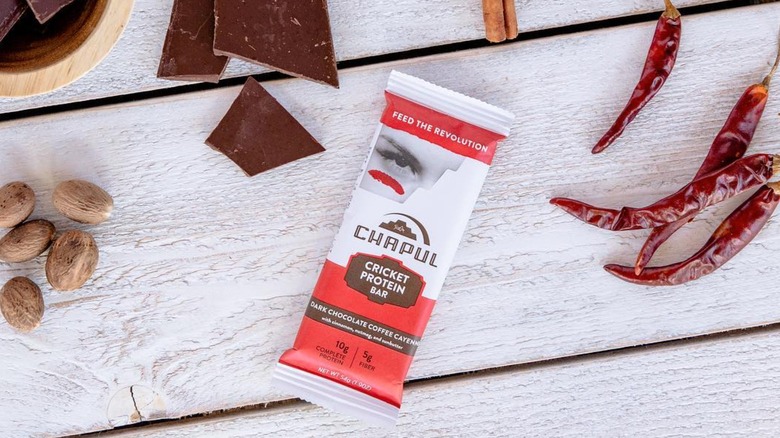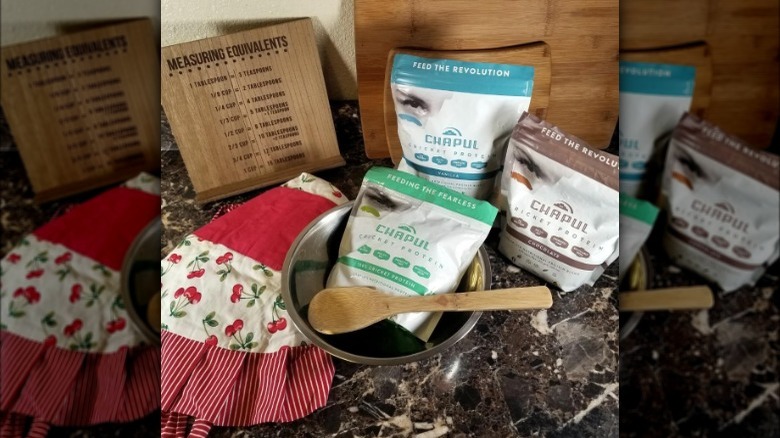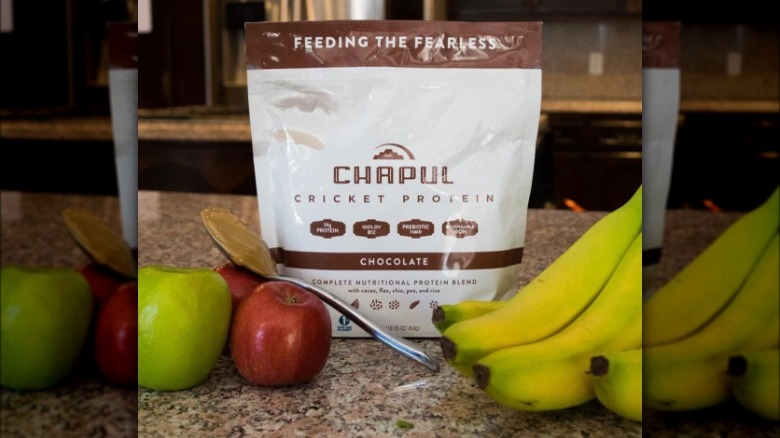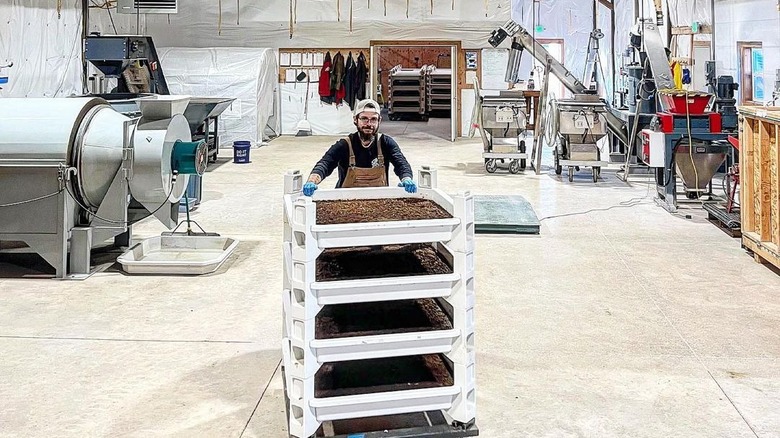Chapul: Here's What Happened After Shark Tank
There are several things that one would expect to find on the ingredient list of a protein bar. There are oats, nuts, and seeds no doubt, as well as chocolate chips, dried fruits, protein powders, and puffed cereals. You may even find oils and sweeteners such as palm oil, xylitol, and sucralose. But before Pat Crowley appeared on "Shark Tank" in season 5, episode 21 with Chapul, few had imagined finding an insect on the list.
As novel as the idea of eating crickets may sound, Crowley said that nearly half the world already considered these bugs as food, which may very well be true — crickets are indeed eaten in several countries — including Mexico, China, Japan, Brazil, Switzerland, and New Zealand. The entrepreneur himself caught onto the idea of eating crickets when he considered the enormous amount of water that it takes to produce protein from livestock. Insects like crickets, on the other hand, require less maintenance as well as less land and give significantly more protein — more than even chicken and pork — in return.
Thinking that it was time to introduce Americans to this environment-friendly, sustainable, and nutritious source of protein, Crowley launched Chapul in 2012, which made protein bars from crickets ground into flour. While some sharks did indeed see the potential in Chapul being the next big thing in the world of sustainable protein, there was more than one shark who simply couldn't get past the idea of crickets lurking in energy bars.
The sharks were intrigued by Chapul's cricket-filled protein bars
Inspired by the Aztec name for crickets, Chapul used cricket flour to make three flavors of energy bars — an Aztec bar made from dark chocolate, coffee, and cayenne; a Thai-themed bar made from coconut, ginger, and lime; and a peanut butter and chocolate bar. Armed with his cricket-filled energy bars, Crowley hoped to secure a $50,000 investment in exchange for 5% equity in Chapul. At the time of his appearance, Chapul had made $50,000 in sales in under a year and was seeing an average of 33% increase in monthly revenue. To sweeten the deal even further, Crowley added that Chapul was the only company approved by the FDA to sell a nutritional, insect-based food item in the market.
Despite having a lot going for it, with something as novel as edible insects, the Sharks were hesitant to get behind Chapul. Kevin O'Leary pointed out that despite its nutritional value and sustainability, it was going to take a long time to turn America into a cricket-eating country and likely more money — things that neither he nor Barbara Corcoran, Robert Herjavec, and Daymond John were willing to get behind. Add to that the fact that killing crickets is thought to bring bad luck in countries like China, and the three were soon off the table. While Robert Herjavec offered $50,000 for 20% equity after making a surprising return, it was Mark Cuban who shook hands with Crowley, taking a 15% slice of Chapul's equity in exchange for $50,000.
Chapul is still in business
Not only was Crowley able to finalize his deal with Cuban after "Shark Tank," but Chapul also greatly benefited from both the investment and the publicity of its appearance on the show. At the time of filming, Chapul's protein bars were already in several natural food stores, bike shops, rock climbing gyms, and crossfire gyms across the country. After the deal with Cuban, however, Chapul cracked its biggest retail deal in the company's history and partnered with Sprouts to put the energy bars in 217 of its outlets. Chapul's energy bars also made their way to over 500 different stores across the U.S. and Canada, setting the company on track to earn $1.5 million in sales in three years after the show aired.
After "Shark Tank," Chapul added new flavors to its existing range of protein bars and expanded its line of cricket-filled products. Chapul introduced matcha tea and banana-flavored protein bars with tahini, almonds, and green tea as well as cricket flour and gluten-free cricket baking flour as Cuban had suggested on the show. The entrepreneur also introduced a line of protein powders made from cricket flour in vanilla and chocolate flavors. While all seemed good for a while, Chapul's focus changed somewhere along the way, and they have since pivoted away from energy bars and edible items.
Chapul no longer makes protein bars
When Crowley appeared on "Shark Tank" in 2014, Chapul was the first company to manufacture a product made from insect protein in the Unites States. Sadly, Chapul's journey in the edible insect business has come to a halt because, while the company is still in business, it's no longer protein bars, flours, and powders that it makes.
Turning Americans into a cricket-eating population proved more difficult than Crowley had thought, as research conducted by Wageningen University in 2017 found that Westerners were still reluctant to eat both insects and meats produced from animals that fed on these bugs (via Food Dive). Crowley also admitted in the update segment of "Shark Tank" that Chapul was dropped by several national retailers after they had a hard time getting customers to buy its cricket-filled goodies more than one time. The final nail in the coffin came in 2018 when Chapul's co-packer went out of business, and Crowley had no choice but to scrap the protein bars.
Although a blow to the business, Crowley said that it wasn't "an admission of defeat" (via Food Navigator). He went on to explain that when Chapul's protein bars were created to grow the industry of packaged products made with insects. Although the rate of growth of the industry has been slow, it has come a long way since 2014. While Crowley hasn't shut down the idea of making cricket protein-packed energy bars again in the future, Chapul has shifted its focus into another aspect of the industry that the entrepreneur thinks needs scaling: insect farming.
Chapul's future is in the insect agriculture industry
Since halting the production of its protein bars, Chapul has pivoted into the world of insect farming. According to Crowley, insect protein takes nearly a thousand times less space than soy protein to produce. To add to that, insects can be farmed using food waste — waste that the U.S. produces 63 million tons of each year. Insects like black soldier fly larvae can grow on this food waste and give in return a sustainable protein that can be used in human, animal, and pet food for long-term food security.
In 2022, Crowley shook hands with another Shark off the screen to get the newly rebranded Chapul off the ground. Backed by Cuban, Crowley partnered with Nexus PMG to launch an insect agriculture company renamed Chapul Farms. The company went on to raise $2.5 million in a funding round in 2022, and it was none other than Daniel Lubetzky who came on board as the new investor.
Backed by not one but two Sharks, Crowley says that Chapul Farms is now on track to be a global pioneer in insect agriculture. While Chapul has made $2 million in lifetime sales, the entrepreneur told viewers on the "Shark Tank" update segment that the true profit lies ahead. With a $50 million robotic insect farm in the works, which is supposed to be operational by 2023, Chapul Farms projects an annual revenue of $20 million — seems like a long way to have come from protein bars filled with crickets that the Sharks were initially put off by!
Chapul uses its insect protein for fish and animal feed
Backed by new investors, Chapul's 600-acre farm in McMinnville, Oregon is now a research and development facility that studies insect agriculture, designs, builds, and operates insect farms, and supplies its black soldier fly larvae commercially. The farm sells crickets in whole-dried and powdered forms as well a range of products made from black soldier fly larvae, including live larvae and ground meal plus its oil and frass. These products are then supplied as feed to fish and poultry farms and turned into pet food and natural soil fertilizer. Plus, if a 2022 study published by Chapul Farms is any indication, its new endeavor is already proving to be successful.
The farm found that there was no negative impact on the growth of salmon when over half of the usual feed made from plants, animals, and fish was replaced by black soldier fly larvae, indicating its success as a more sustainable alternative for fish feed in aquaculture. According to Chapul, the high protein content of black soldier fly larvae also improves egg production among chickens, its lauric acid enhances cognition among pets, and fertilizers made from black soldier fly can improve the overall structure of soil. Though Chapul Farm supplies its insect products commercially upon request, the website does mention that the farm is still working on scaling its domestic production. With two Sharks on board and a $50 million facility, however, it's only a matter of time before that happens.






